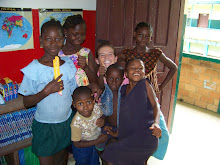On Thursday afternoon, Ann Elizabeth and I had the opportunity to travel to the American Library (a section of the US Embassy) with 5 students and their faculty sponsor, Mr. Sarnor, for a DVC (Digital Video Conference). For these 5 students - Bendu, Isatta, Watchen, Joroam, and Theophilus - DVC was nothing new. There have been several opportunities in the past for them to conference with others - whether they be at other schools in the US or members of a church, etc. The DVC is no casual Skype session - it is typically a formal affair about a specific topic that involves hours of preparation before the conference. Typically the DVCs are held in the morning so I have never been able to go due to my class schedule; with this one being in the afternoon it was the perfect opportunity for me to be able to see the students in action. The information the students received prior to this session stated that the discussion would be held with students in South Africa and Uganda about the state of the Liberian government under Ellen Johnson Sirleaf's presidency and the progress or problems they perceived since she took office.
We arrived at the American Library and sat around a U-shaped conference table with a TV and camera at the top of the U. The room was fairly plain with the exception of pictures from Liberia - especially ones with the American Ambassador - and portraits of Barack Obama, Joe Biden, and Hilary Clinton. After a little waiting, the TV was dialed into a conference. We weren't sure exactly what was happening at first, but eventually we figured out we were watching a conference between the US and Cameroon but we were not participating. That conference was mostly about journalism, freedom of press, and social networking sites. We could see and hear the American participants well, but it was virtually impossible to hear the students in Cameroon. After their conference was over, we were told it was Liberia's turn.
New American panelists came out and we listened to them introduce themselves to boisterous applause. Even though the panel was only made up of 5 people, it was evident they were in a large hall with a big audience. No introduction of our students in Liberia was made. The conference started with a discussion of youth leadership and how young people are involved in the development and rebuilding of post-war Liberia. There was one question about progress being made in Liberia under Ellen Johnson Sirleaf, but then we seemed to go off on a tangent about how music inspires and influences youth. These were not the questions that our students had spent hours preparing. What was interesting to me was that the American and Liberian students were being asked similar questions; I expected each to talk about their own country, but apparently the American students had researched Liberia prior to the DVC. While the American students sat in their large cushy chairs and gave responses on microphones met with boisterous applause, the students here in Liberia fought to speak loud enough for one central microphone to pick up their voice. Worst of all, there was a terrible echo - delayed about 5 seconds - in our small little room. Because of this delay, students were often cut off when they attempted to add to another student's response to a particular question. The DVC was cut short after about 10 minutes due to technical difficulties - sadly before all the Liberian students even had a chance to speak. After the DVC was over, we could hear comments being made to the participants in the US - "please go to such and such room for lunch." We wished we could join in for lunch! The difference in circumstances, to me, was stark.
What was most impressive, however, was the composure with which our students performed in the situation. It was clear their previous DVCs had not had these kind of technical difficulties. Despite the echo, the seemingly random questions, and the general confusion of the DVC, the Ricks students were composed and confident in their answers. I don't think anyone could tell that the answers they gave were not the responses they prepared. Anyone who has observed the educational system in the US and Liberia will tell you that Liberia is behind - how could they not be after 14 years of civil war? But in all honesty and with as much objectivity as possible, I would say the Liberian students answered the questions better than the American discussants. This speaks volumes of these 5 youth and their potential as future leaders of Liberia.
I left this DVC thinking over the whole situation. Who was really benefiting from this? At first I thought bitterly of the American students in their enormous hall with ego assuaging applause after every response and the authority with which they felt they could speak about Liberia after doing a little research. And then I thought fondly of our Liberian students, sitting in their plain little room after hours of preparation feeling disappointed by the brevity and lack of depth to the discussion. Then I took a step back - both groups of students were making a genuine effort to communicate across the Atlantic about a common topic. They were both doing the best in their particular circumstances. And despite the shortcomings of the conversation, they did engage in conversation. If nothing else, these students benefited from making the effort to communicate and prepare for this conversation, even if the conversation itself was a bit lackluster. Technology is not perfect, no matter where in the world you are. What was important on this day was the intent and the effort to learn from others, and I think that did happen on some level.
Subscribe to:
Post Comments (Atom)

No comments:
Post a Comment